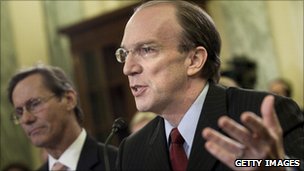BAK
JF-Expert Member
- Feb 11, 2007
- 124,789
- 288,011
14 June 2011 Last updated at 12:47 ET [h=1]US: Iraq reconstruction billions 'may have been stolen'[/h]

Mr Bowen, the special inspector general for Iraq reconstruction, said a third audit is being carried out
Some $6.6bn (£4bn) flown into Iraq eight years ago may have been stolen, according to a US official investigating fraud in the country.
The missing money may represent "the largest theft of funds in national history", investigator Stuart Bowen told the Los Angeles Times newspaper.
A third audit is being conducted to find the money, which was shipped from the US between 2003-2004, he said.
The cash, which belonged to Iraq, was intended to pay for reconstruction.
The money came from a special fund set up by the Federal Reserve Bank of New York with Iraq's own money, which was previously withheld from the country under harsh economic sanctions imposed against Saddam Hussein's regime.
The funds were airlifted aboard C-130 military cargo planes by the Bush administration in shrink-wrapped bricks, as part of a $20bn reconstruction package.
'Loose and unregulated' Mr Bowen, the Special Inspector General for Iraq Reconstruction, blamed the system that existed at that time for the missing money.
"The system was too loose and unregulated in 2003 and 2004," he said.
The Los Angeles Times reported that some officials in Baghdad have threatened to take the US government to court to reclaim the missing cash, which primarily came from Iraqi oil sales.
Mr Bowen did not speculate on who he believed may have made off with the loot.
"But this money was delivered to Iraqi control, and we have in the past had a number of cases reported to us about interim ministers who did steal," he said.
Pentagon officials have said for the past six years that they could account for the money if provided with enough time to track down the records.

Mr Bowen, the special inspector general for Iraq reconstruction, said a third audit is being carried out
Some $6.6bn (£4bn) flown into Iraq eight years ago may have been stolen, according to a US official investigating fraud in the country.
The missing money may represent "the largest theft of funds in national history", investigator Stuart Bowen told the Los Angeles Times newspaper.
A third audit is being conducted to find the money, which was shipped from the US between 2003-2004, he said.
The cash, which belonged to Iraq, was intended to pay for reconstruction.
The money came from a special fund set up by the Federal Reserve Bank of New York with Iraq's own money, which was previously withheld from the country under harsh economic sanctions imposed against Saddam Hussein's regime.
The funds were airlifted aboard C-130 military cargo planes by the Bush administration in shrink-wrapped bricks, as part of a $20bn reconstruction package.
'Loose and unregulated' Mr Bowen, the Special Inspector General for Iraq Reconstruction, blamed the system that existed at that time for the missing money.
"The system was too loose and unregulated in 2003 and 2004," he said.
The Los Angeles Times reported that some officials in Baghdad have threatened to take the US government to court to reclaim the missing cash, which primarily came from Iraqi oil sales.
Mr Bowen did not speculate on who he believed may have made off with the loot.
"But this money was delivered to Iraqi control, and we have in the past had a number of cases reported to us about interim ministers who did steal," he said.
Pentagon officials have said for the past six years that they could account for the money if provided with enough time to track down the records.
